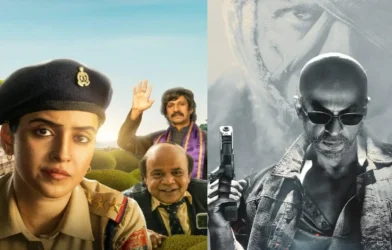Some films cross borders the way mist drifts over the Ganges at dawn — soft, slow, and almost invisible until you notice the chill on your skin. They don’t fight for your attention. They wait, sure-footed, telling their stories frame by frame, patient as the river. Indian cinema isn’t just glossy musicals and box-office thunder; it’s also bruised knuckles, small rebellions, and laughter cut with ache. A selection as spicy as its signature dishes.
But most nights, we keep scrolling. Headlines bark about global hits. Trailers roll by. And those quieter films sit in the shadows of streaming menus — waiting. It’s fitting, in a way, that we miss them while checking messages, tracking scores, or half-watching the flicker of online baccarat in another tab. Yet beyond the neon and noise, these films hold stories stitched from sweat, stubborn hope, and a refusal to look away.
Court (2014): A Silence Louder Than Verdicts
Some stories don’t shout. Court doesn’t bother with grand speeches or last-minute evidence that saves the day. Instead, it shows hearings postponed, lawyers drained by routine, and a system that grinds on, patient as stone. The accused, a folk singer charged under anti-terror laws, barely seems the centre of the film. The real subject is the machinery itself — how slow it turns, and how power lies in its slowness.
The genius here is in the dust on the windowsill, the broken fan spinning overhead, the judge’s sigh at yet another adjournment. It leaves you uneasy, because the system isn’t failing; it’s working exactly as built. When the credits roll, there’s no triumph — just the quiet realisation you’ve seen something true.
Udaan (2010): Escape Written in Small Letters
Udaan is rebellion without fireworks. A teenage boy thrown out of boarding school returns to an industrial town and a father forged in iron and anger. The boy writes poetry; the father wants him to work steel. Between them hangs every unsaid insult, every rule meant to be broken.
What makes Udaan sing isn’t plot — it’s how it lingers on brick walls at dawn, empty classrooms steeped in regret, and the raw courage it takes to choose your own path. It understands that rebellion isn’t always loud; sometimes it’s packing a bag in silence and walking toward what scares you most. And somewhere in those grey alleys, it finds hope.
The Lunchbox (2013): Love Served Cold and Honest
A misdelivered lunchbox in Mumbai. Notes passed between strangers. That’s all it takes. The Lunchbox never raises its voice. Instead, it lets love grow quietly between the clink of cutlery and the hiss of city trains. Every curry leaf, every steam curl feels like part of a shared ritual.
It’s the sort of film that makes you think of small, unexpected moments: a forgotten letter, a late-night message from someone you thought was gone, or an idle chat while half-watching online baccarat. Fragile connections. Easily missed, but impossible to forget once made.
Ship of Theseus (2013): Questions That Refuse Answers
If every plank of a ship is replaced, is it still the same ship? Ship of Theseus takes this question and turns it into cinema. Three stories: a blind photographer who regains sight, a monk fighting for animal rights, and a stockbroker chasing stolen organs. Each tale asks what makes us who we are.
It doesn’t offer clean answers. And that’s the point. Some scenes drift close to abstraction; others hit with intimate force. But it stays with you, unsettling and oddly comforting at once. In a world trained to pounce on rumors and quick takes, Ship of Theseus offers the rare pleasure of not knowing — and realising that might be enough.
Masaan (2015): Ashes, Shame, and Small Beginnings
Masaan is set on the ghats of Varanasi, where the living brush against death every day. Two threads: a girl fighting the weight of scandal and a boy who falls in love across caste lines. Tragedy comes early, but the film isn’t really about grief. It’s about what comes after.
There’s a tenderness here, even in scenes filled with ash and funeral smoke. The Ganges carries away more than bodies; it carries guilt, secrets, and sometimes a chance to begin again. By the final shot, you see not endings but quiet, stubborn rebirth.
Why These Stories Matter
They don’t chase applause. They trade spectacle for scars, explosions for silences that say more. They pull back the curtain on places tourists don’t see: cramped courtrooms, small-town bedrooms, railway canteens at dawn. And they ask us to look — not as critics, but as witnesses.
In a feed packed with trailers, memes, and hot takes, these films offer a different kind of entertainment — one that sits with you long after the screen goes black. They’re reminders that cinema can do more than distract; it can reveal, question, and sometimes, quietly heal.









